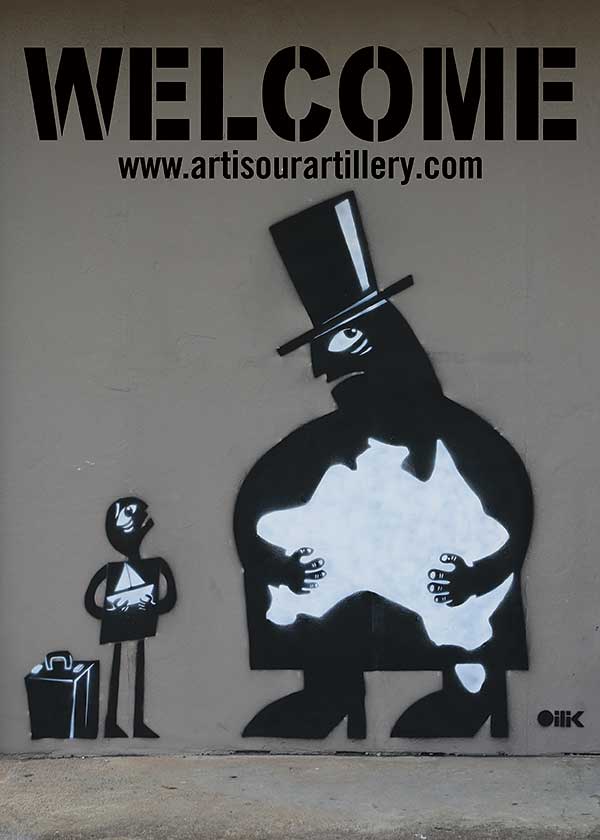Iran-born visual artist Hesam Fetrati dreams of a ‘Shared Australia’. An Australia that welcomes refugees and asylum seekers rather than locking them up in detention and abolishes phrases like ‘illegal immigrant’ from its vernacular. Amnesty International Australia grabbed 10 minutes to chat with Hesam about the power of art in creating social change.
In his late 20s, Hesam left the “megacity” of Tehran and his job as a political cartoonist to complete his Masters and Doctorate degree in the comparatively-sleepy city of Brisbane. Hesam’s prize-winning works explore social and political themes, along with reflecting his own personal journey and experience with war. “Peace and hope are the two most important topics for me [in my work],” he says.
Since his arrival in Australia, Hesam’s eyes were opened up to the appalling treatment by the Australian government of refugees and asylum seekers. His artwork started exploring these themes and he has teamed up with ARTillery and Amnesty International to create the graffiti work ‘Shared Australia’, to help to raise awareness.
“I have chosen stencil art/graffiti [for this piece], because this technique contains the concept of protest. Also, this technique is ‘illegal’ same as ‘illegal’ immigrants,” he says.
‘Shared Australia’
 In the work ‘Shared Australia’ we see a little boy and his suitcase – the only possession he has in the world and a symbol of his displacement. He clings to a paper boat, which depicts the perilous journey that many asylum seekers undertake in order to reach safety.
In the work ‘Shared Australia’ we see a little boy and his suitcase – the only possession he has in the world and a symbol of his displacement. He clings to a paper boat, which depicts the perilous journey that many asylum seekers undertake in order to reach safety.
The giant man with hat and dark suit is a stereotypical Australian politician. The tyrannous gatekeeper to the ‘golden’ shores of Australia. He holds the geographical map of Australia close to his chest and he refuses to share it with the asylum seeker. The word ‘Welcome’ is stencilled above ironically
“‘Shared Australia’ refers to the matter of displacement,” says Hesam. “I have chosen stereotypes and symbols to explain the issue.”
The piece also refers to the policies by the Australian government around refugees, he explains, and the way mainstream media portrays mainstream as a “mass group”, without any individuality. “I believe refugees are portrayed as not only voiceless, but as faceless,” says Hesam.
When asked what he hopes his artwork will inspire, he says: “If my audience thinks about the issue that I have addressed, this achievement is more than enough for me. I believe art should create questions.”
However, the impact of his work succeeds in more than just forming questions. “Last year I received a message from a girl in London,” says Hesam. “She said: ‘As an African black girl who has grown up in France and lives in London, life was not easy for me. But I found my story in your work’. It was very emotional and proud moment for me.”
“Art, itself, cannot change the world
Art can educate
Art can create questions
Art can help people to seek the answers
We. People can create change”
Hesam Fetrati
You can print out your own copies of Hesam’s ‘Shared Australia’ poster and put them up in your neighbourhood (legally please!). Find out more at www.artisourartillery.com.
